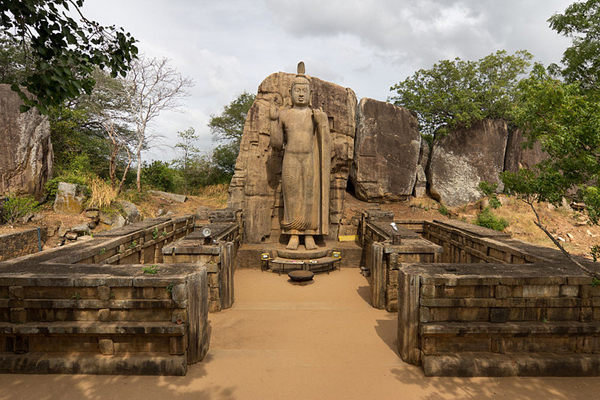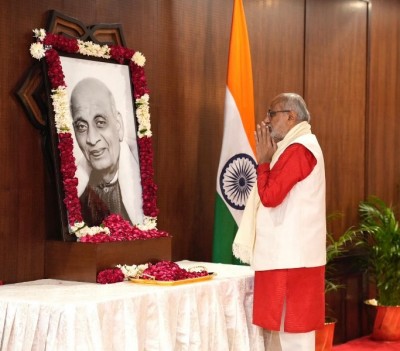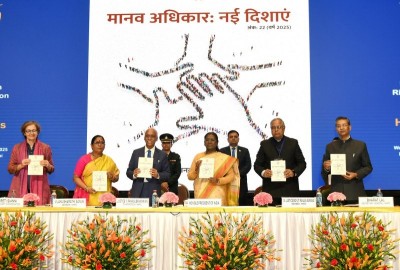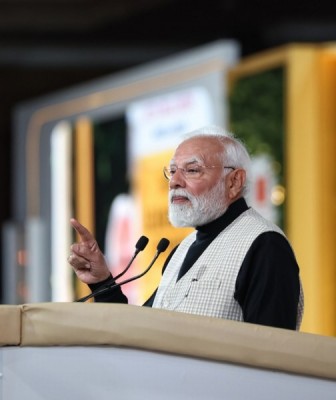
Conflicting Reconciliation
Hours after the draft resolution was submitted to the Human Rights Council, announcing his Government's decision on September 24, 2015, Sri Lankan Prime Minister (PM) Ranil Wickremesinghe declared, "Our representative in Geneva, along with the US representative and delegates from other countries agreed to co-sponsor the draft resolution. We are no longer in a cage, and we no longer have to face the pressures. As such of the biggest issues facing our country in the past five to six years has been removed (and) we can face the future with confidence. We can face the future without fear. We have agreed on implementing a political solution and bringing in the necessary constitutional reforms. The world has accepted the fact that we are building a democratic society."
Wickremesinghe also disclosed that a special Judicial Commission, the "Office of the Special Counsel", subject to local laws and regulations, would be set up to investigate allegations of human rights violations and promote reconciliation and accountability: "We will certainly obtain help not only from Sri Lankans but Commonwealth and foreign judges and lawyers. But it will have to be carried out under the Sri Lankan Constitution."
Some of the operative paragraphs of the draft resolution include:
The Human Rights Council
Welcomes the positive engagement between the Government of Sri Lanka and the High Commissioner and his Office since January 2015 and encourages the continuation of such engagement in the promotion and protection of human rights and in exploring appropriate forms of international support to and participation in Sri Lankan processes for seeking truth and justice
Recognizes the need for a process of accountability and reconciliation for violations and abuses committed by the Liberation Tigers of Tamil Eelam as highlighted in the OISL report
Encourages the Government of Sri Lanka. for the trial and punishment of those most responsible for the full range of crimes under the general principles of law recognized by the community of nations relevant to violations and abuses of human rights and violations of international humanitarian law, including during the period covered by the Lessons Learned and Reconciliation Commission [LLRC]. The LLRC was mandated to inquire and report on matters that may have taken place during the period between February 21, 2002, and May 19, 2009. The LTTE and the Government had signed ceasefire agreement on February 21, 2002. The ceasefire ended on January 16, 2008. Subsequently, the war began which officially ended on May 19, 2009.]
Encourages the Government of Sri Lanka to introduce effective security sector reforms as part of its transitional justice process that will help enhance the reputation and professionalism of the military and include ensuring that no scope exists for retention in or recruitment into the security forces of anyone credibly implicated through a fair administrative process in serious crimes involving human rights violations or abuses or violations of international humanitarian law including members of the security and intelligence units; and increasing training and incentives focused on the promotion and protection of human rights of all Sri Lankans
Welcomes the Government's recognition that accountability is essential to uphold the rule of law and build confidence in the people of all communities of Sri Lanka in the justice system, takes note with appreciation of the Government of Sri Lanka's proposal to establish a Judicial Mechanism with a Special Counsel to investigate allegations of violations and abuses of human rights and violations of international humanitarian law, as applicable; and affirms that a credible justice process should include independent judicial and prosecutorial institutions led by individuals known for integrity and impartiality; and further affirms in this regard the importance of participation in a Sri Lankan judicial mechanism, including the Special Counsel's office, of Commonwealth and other foreign judges, defence lawyers, and authorized prosecutors and investigators
Welcomes the initial steps taken to return land and encourages the Government to accelerate the return of land to its rightful civilian owners, and to undertake further efforts to tackle the considerable work that lies ahead in the areas of land use and ownership, in particular the ending of military involvement in civilian activities, the resumption of livelihoods and the restoration of normality to civilian life, and stresses the importance of the full participation of local populations, including representatives of civil society and minorities, in these efforts
Welcomes the Government's commitment to a political settlement by taking the necessary constitutional measures and encourages the Government of Sri Lanka's efforts to fulfill its commitments on the devolution of political authority, which is integral to reconciliation and the full enjoyment of human rights by all members of its population; and encourages the Government of Sri Lanka to ensure that all Provincial Councils, are able to operate effectively, in accordance with the 13th amendment to the Constitution of Sri Lanka
The Tamil National Alliance (TNA), which is the largest Tamil political party and has been the main advocatory of a foreign-led investigation into war crimes, has welcomed the Government's decision. In a statement issued on September 25, 2015, TNA observed, "In particular, we welcome the draft resolution's call on Sri Lanka to involve foreign and Commonwealth judges, lawyers, investigators and defenders in a judicial mechanism to be set up in Sri Lanka that would be mandated to try international crimes. This constitutes a significant victory for justice in Sri Lanka." The statement went on to add that TNA was committed to help the Government and international stakeholders evolve such a court, and will support its work, arguing, "A court established on these lines would represent a dramatic break from the past and could herald the beginning of an end to impunity." Though it admitted that it is "acutely aware that some of the language used in the interests of a consensus will not satisfy all victims of the conflict whom we represent and who have reposed their trust in the TNA", it asserted, "However, we are of the view that the draft provides a constructive starting point for what will inevitably be a long road to reconciliation."
At present, TNA has been recognized as the Main Opposition and its leader R. Sampanthan was designated as Opposition Leader. TNA has 16 Members in the current Sri Lankan Parliament, for which elections were held in August 2015. Out of 13 seats for which elections were held in the Northern Province, TNA won nine. Similarly, out of 13 seats in the Eastern Province, TNA won five. In total, TNA won 14 'District-basis seats' and two 'National-basis seats' [The District-basis seats are those for which direct elections are held. There are 29 'National-level seats' which, according to the 15th Amendment to the Constitution, which introduced Article 99A, are decided on the basis of the total number of votes polled by the respective political parties or independent groups at the national level.] TNA is also the ruling party in the Northern Provincial Council. Any positive testimonial on the part of the party augurs well for Colombo in its pursuit of a permanent resolution, as TNA has a major say in the Tamil dominated regions. Significantly, on September 4, 2015, TNA spokesman M. A. Sumanthiran had stated, "We will talk to the Government straightaway with a view to resolving the long outstanding matter." Bilateral talks between the TNA and the Sri Lankan Government which commenced in January 2011 went on till January 2012. No talks have taken place thereafter.
Meanwhile, PM Wickremesinghe apparently buckling under domestic pressure, on September 27, 2015, backtracked, declaring that Sri Lanka's domestic mechanism to probe the alleged rights abuses during the military conflict with the LTTE cannot have foreign judges due to constitutional impediments, and that his Government could "only act within the framework of the Sri Lankan Constitution, which does not allow foreign judges to operate in the country." However, "Sri Lanka will seek the consultations of foreign judges and lawyers for the domestic mechanism to probe the alleged rights violations." For this, a new law would be introduced to allow the foreign judges and lawyers, who want to "assist" in the investigation process, to operate under the Sri Lankan system in providing assistance for the investigations. He also disclosed that the Government had discussed this with USA. Wickremesinghe disclosed that Foreign Minister Mangala Samaraweera will apprise the UNHRC of the constitutional constraints when Sri Lanka will be discussed in Geneva on 30th September.
Indeed, former President Mahinda Rajapaksa, who along with his brother Gotabhaya Rajapaksa, the former Secretary of Defence, is the foremost among those who could be tried for their role during the war, claimed that the resolution has "hostile provisions". He stated that even if the Government is going to accept this resolution and allow it to pass by consensus, they should ensure that the "hostile provisions" are removed and the resolution is brought into line with the expectations of the people of Sri Lanka. On September 22, 2015, prior to the tabling of the draft resolution, he had called upon the government to reject the OISL report.
Reports suggest that Wickremesinghe has asserted that he and his Government had saved both the Rajapaksas (Mahinda and his brother Gotabhaya) from facing an international war crimes inquiry by "properly handling" the issue. This, however, would give cold comfort to the Rajapaksas, since nothing in the draft UNHRC resolution suggests that they would be excluded from the 'reconciliation and accountability' process. Clearly, moreover, no such exemption could extend to other leaders and top military commanders either.
It is useful to note that, though the ruling National Government has a 2/3rd majority in Parliament, many of its members are Rajapaksa loyalists. They may have been pacified with ministerial or deputy ministerial positions, but could, at any point of time, switch allegiance and destabilize the Government. This is among the most emotive and polarizing issues in Sri Lankan politics, and would affect Rajapaksa most, thus creating enormous opportunities for destabilization.
Further, the Lanka Sama Samaja Party (LSSP), a leftist formation, called on the Government not to comply with the UNHRC moves. The LSSP General Secretary Prof. Tissa Vitharana declared, "We oppose all forms of discrimination on the basis of race, religion, caste or gender. As such we shall support all genuine efforts made by the present Government to achieve reconciliation and national unity, provided no outside interference is permitted. If the need for any foreign assistance should arise it could be sought by us at our discretion. It must not be thrust on us as is being attempted by the UNHRC." Another leftist party, the Mahajana Eksath Peramuna (MEP, People's United Front), also opposed the move.
Earlier, welcoming the decision, US Secretary of State John Kerry had noted, "This resolution marks an important step towards a credible transitional justice process, owned by Sri Lankans and with the support and involvement of the international community. The resolution will help families of the missing find answers about their loved ones. And it lays out a path to provide truth, justice, reparation, and guarantees of non-recurrence that the Sri Lankan people deserve, while safeguarding the reputation of those, including within the military, who conducted themselves with honour and professionalism." Kerry importantly added, "In the past year, the Sri Lankan people have twice voted to put Sri Lanka on the path to peace and turned their country away from a divisive approach that for too long sapped Sri Lanka's strength."
An environment suitable for the 'reconciliation process' on the ethnic issue began to crystallize soon after Maithripala Sirisena assumed power as the Seventh Elected Executive President of Sri Lanka on January 9, 2015, defeating the then President Mahinda Rajapaksa. The subsequent victory of Ranil Wickremesinghe in General Elections further strengthened this process, as Rajapaksa lost the elections this time as well.
When Colombo decided to sponsor this draft resolution containing some of the major demands by ethnic Tamils, it was expected that the impediments in the path towards setting up an institutional mechanism for the reconciliation process would further diminish. However, the change in stand on the issue of foreign judges, the most vital aspect of this resolution, is indeed a setback in this direction and a lot will depend on the wording of the final draft, to be adopted in few days time. The draft resolution which was tabled on September 24, 2015, was itself much diluted in comparison to earlier resolutions, and any further dilution is likely to antagonize the Tamil political formations. Notably, one of the 'operative paragraphs' of the UNHCRresolution adopted on March 27, 2014, had stated that it, "Calls upon the Government of Sri Lanka to release publicly the results of its investigations into alleged violations by security forces, including the attack on unarmed protesters in Weliweriya on 1 August 2013, and the report of 2013 by the court of inquiry of the Sri Lanka Army". It had taken note "of the recommendations and conclusions of the High Commissioner regarding ongoing human rights violations and the need for an international inquiry mechanism in the absence of a credible national process with tangible results, and requests the Office of the High Commissioner."
Crucially, there is absence of any such direct reference of allegations against the SFs as well as the demand of international inquiry in the current draft resolution.
The 'watering down' was very much expected as the US policy towards Sri Lanka had changed. John Kerry during his two-day visit to Sri Lanka in May 2015, during a function at Taj Samudra Hotel, Colombo, on May 2, 2015, had stated, "It is sometimes necessary to go to war, despite the pain it brings. For all of my country's disagreements with the previous government in Sri Lanka over how it fought the LTTE, we clearly understood the necessity of ridding this country of a murderous terrorist group and the fear that it sowed." The change in policy was primarily because of rising Chinese interest in Sri Lanka due to its strategic location. Kerry had then pointed out: "Your country sits at the crossroads of Africa, South Asia and East Asia... The Indian Ocean is the world's most important commercial highway."
Colombo has done exemplary work in rehabilitation and the restoration of the Northern Province in its attempt to win the hearts and minds of people residing in the region, and the latest decision is a further gambit in that direction. It remains to be seen, however, whether the institutional mechanisms to pursue the ends of 'reconciliation and accountability' actually succeed in serving these ends, or become part of an abrasive political process between polarized ethnic communities. It is significant that several grievances over power sharing and the equality of status and rights of all citizens continue to be articulated by the Tamil leadership.
Support Our Journalism
We cannot do without you.. your contribution supports unbiased journalism
IBNS is not driven by any ism- not wokeism, not racism, not skewed secularism, not hyper right-wing or left liberal ideals, nor by any hardline religious beliefs or hyper nationalism. We want to serve you good old objective news, as they are. We do not judge or preach. We let people decide for themselves. We only try to present factual and well-sourced news.







